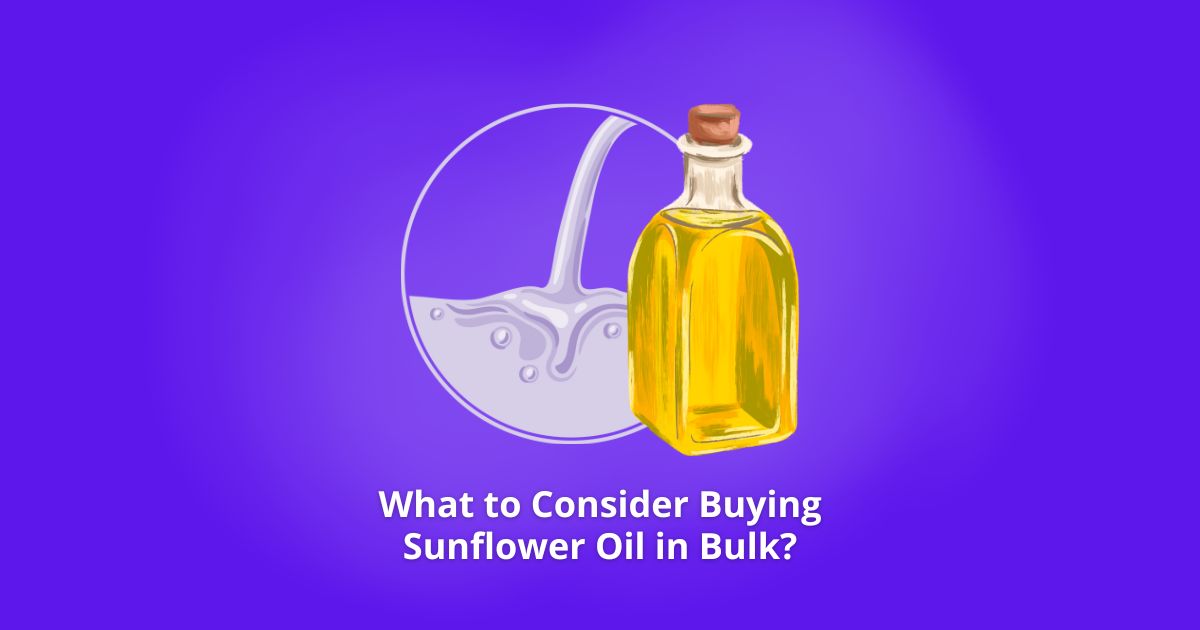From crisp-fried snacks to vegan spreads, sunflower oil powers countless food lines. Yet ordering container loads is very different from purchasing a few catering tins. When volumes rise, every minor variable — seed grade, transit humidity, demurrage clauses — quickly multiplies into major cost or safety concerns.

Whether you’re sourcing for culinary use, industrial production, or white-label distribution, understanding the key factors involved in bulk procurement is essential for maintaining product quality, cost efficiency, and supply chain consistency.
Define Your Technical Requirements
-
Refining level: Decide on crude, refined, or refined-and-deodorised oil; each grade differs in flavour stability and shelf life.
-
Key analytics: Fix maximum values for free-fatty acids, peroxide number, moisture, and colour (Lovibond). Insist on a certificate of analysis for every lot.
-
GMO status and allergens: Many markets require PCR-based non-GMO confirmation and allergen statements.
-
Packaging format: Choose flexitank, ISO tank, IBC, or bottles at the contract stage; repacking later raises oxidation risk.
Verifying Supplier Credentials and Certifications
Reliable sourcing is critical. Ensure suppliers hold international certifications such as:
-
ISO 22000 or FSSC 22000 for food safety.
-
HACCP for hazard control.
-
Kosher, Halal, and Organic certifications as per market demand.
Reviewing these credentials minimizes risk and ensures compliance with local and international food safety standards. Additionally, confirm that the supplier has a proven export track record and meets the country-specific import requirements.
Negotiating Pricing and Payment Terms
Understanding the market dynamics of sunflower oil pricing is vital. Prices fluctuate based on:
-
Harvest seasons in major producing countries.
-
Crude oil prices and transportation costs.
-
Geopolitical factors impacting supply routes.
Bulk buyers often negotiate discounts for volume or repeat orders. Transparency in pricing structure—such as CIF vs FOB—should be clarified at the quotation stage.
Understanding Logistics and Delivery Timelines
Efficient logistics directly impact cost and freshness. Important considerations include:
-
Shipping terms (Incoterms 2020): CIF, FOB, DDP, etc.
-
Transit time to your port or warehouse.
-
Customs clearance responsibilities.
-
Temperature control requirements, especially in hot climates.
Collaborate with experienced freight forwarders and ensure that packaging is compliant with the regulatory requirements of your destination country.
Why Many Buyers Choose QP Foods?
QP Foods, a leading sunflower oil manufacturer and sunflower oil supplier in Ukraine, operates several vertically integrated plants that cover pressing, refining, bottling, and private-label packaging under one corporate roof — an approach that tightens quality control and guarantees repeatability.
The company operates five separate production sites and continues to expand, ensuring robust capacity even during regional disruptions.
For European customers, a dedicated UK warehouse shortens lead times and cuts freight costs, giving access to pallet-lot deliveries within days.
QP Foods also offers a full-package service model that couples premium goods with marketing support, an experienced sales team, private-label options, coordinated logistics, and 24/7 customer assistance — ideal for buyers who want to consolidate their supply chains.
Conclusion
Bulk sunflower oil purchasing hinges on much more than securing the lowest quote. By clarifying technical specifications, auditing food-safety systems, pressure-testing supply continuity, verifying logistics, and agreeing with transparent terms, you protect both product quality and brand reputation.
Integrated suppliers such as QP Foods demonstrate how strong capacity, end-to-end traceability, and locally stocked inventory combine to deliver a steady flow of compliant sunflower oil, batch after batch, season after season.